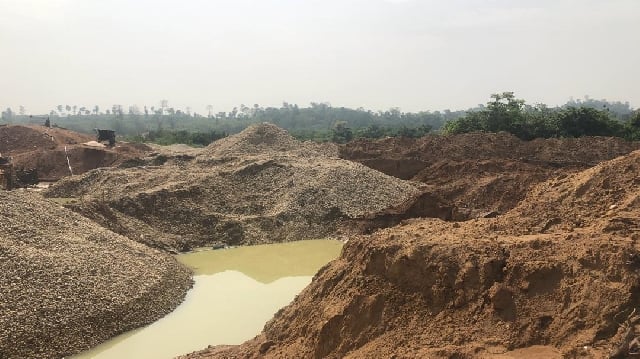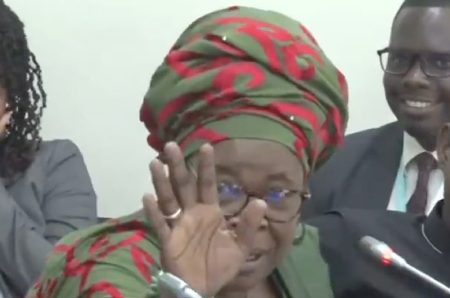The Offin Shelterbelt Forest Reserve in Ghana’s Ashanti Region has become the latest casualty in the ongoing battle against illegal mining, locally known as “galamsey.” Over 30 hectares, a significant portion of this vital ecological zone, have been decimated by these illicit operations, leaving the Offin River, the lifeblood of the reserve, heavily polluted and scarred. Lands and Natural Resources Minister, Emmanuel Armah Kofi Buah, expressed his dismay during a site visit, describing the level of destruction as “heartbreaking.” This recent devastation underscores the urgent need for decisive action to curb the rampant illegal mining activities that plague Ghana’s forest reserves and threaten the nation’s natural resources. The Offin Shelterbelt is just one of 44 forest reserves currently under siege, with the total area impacted by galamsey equivalent to a staggering 7,500 football fields, a stark visualization of the environmental crisis unfolding.
The government’s response to the escalating crisis has involved a combination of enforcement actions and policy reforms. Fifteen excavators, the primary tools used by illegal miners to rip apart the earth, have been seized from the Offin Shelterbelt, and two Chinese nationals directly involved in the destruction have been arrested. This follows the apprehension of seven other Chinese nationals and their eight Ghanaian accomplices on the Ankobra River the previous week, all of whom are currently remanded in custody. These arrests signal a clear intent to hold perpetrators accountable, regardless of their nationality. Minister Buah emphasized President Mahama’s unwavering commitment to combating illegal mining, assuring the public that every effort would be made to address the issue effectively and bring those responsible to justice. The government is also pursuing not just the miners themselves, but also the individuals and entities financing their operations and providing the machinery, aiming to dismantle the entire illegal mining network.
Central to the government’s strategy is a restructuring of the mining licensing regime. The proposed changes aim to increase transparency and accountability by incorporating active roles for community leaders and regulatory authorities, including the Environmental Protection Agency (EPA) and the Minerals Commission, in the licensing process. This collaborative approach seeks to ensure that mining activities are conducted responsibly and with due consideration for environmental and social impacts. A key component of this reform involves a proposed amendment to be presented to Parliament, seeking to revoke the President’s authority to grant mining licenses in forest reserves. This move represents a significant shift in policy, designed to strengthen safeguards against exploitation and prioritize the protection of these vulnerable ecosystems.
However, the government’s efforts are complicated by conflicting policies and external pressures. Despite the commitment to combating illegal mining, a legislative instrument (LI 2462) issued in November 2022 allows for mining in forest reserves, including biodiversity hotspots. This directive has drawn sharp criticism from environmentalists who argue that it contradicts the government’s stated objectives and exacerbates the problem. They call for the revocation of LI 2462 and the implementation of stricter measures to protect Ghana’s remaining forests. Furthermore, the Minister revealed that he had received requests for the release of some of the arrested Chinese galamsey operators, highlighting the challenges faced in enforcing the law and resisting external influence. He firmly stated that only the President has the authority to make such decisions and warned against any further attempts to intervene in the judicial process.
The long-term impact of illegal mining on the Offin Shelterbelt Forest Reserve and other affected areas is profound and far-reaching. Studies have documented the extensive degradation caused by galamsey in the Offin Shelterbelt since 2010, with approximately 2.5 km² (4.4%) of the reserve destroyed within five years. This destruction has not only decimated the forest ecosystem, but also impacted local communities who rely on the forest for their livelihoods, including cocoa farmers whose farms have been ruined and communities whose water sources have been polluted. The high cost of evicting illegal miners, coupled with their frequent return, underscores the need for a more sustainable and holistic approach to tackling the problem.
The government’s commitment to reclaiming the Offin Shelterbelt and initiating reforestation efforts through the “Tree for Life” initiative is a positive step towards restoring the damaged ecosystem. However, the success of these efforts hinges on the effective implementation of the proposed policy reforms, coupled with consistent and robust enforcement. The ongoing battle against illegal mining in Ghana highlights the complex interplay between environmental protection, economic development, and political will. The government’s renewed commitment to addressing this issue represents a crucial opportunity to safeguard the nation’s natural heritage and promote sustainable development. The effectiveness of these measures will ultimately determine the fate of Ghana’s forests and the well-being of the communities that depend on them.














